Review: 'I May Destroy You' and its Groundbreaking Conversation around Trauma and Assault
From its incredibly complex characters to its discussions about consent and sexual assault, Michaela Coel’s newest creation is guaranteed to destroy you.

This review contains spoilers for the first season of I May Destroy You as well as discussions around rape trauma and sexual assault.
After a night out where Arabella (Michaela Coel) was spiked and memories slurred, she slowly starts to gather together the pieces of the puzzling night together. A scenario in her mind of a man blocking a bathroom door as he thrusts and stares at her keeps coming back to her, and she ends up filing a police report about the ‘thing in her head’.
This series is written, created, co-directed and performed by Michaela Coel who based the series off of her own experience with sexual assault. Coel famously turned down a $1 million dollar offer from Netflix to keep full creative control and ownership of the show - now if that doesn’t scream integrity, then I don’t know what does.
The decision paid off as well; every scene of the show radiates with immense power and authenticity. The shots, the words, the music, has such a clear deep personal connection to the creator, you can’t help but feel it tremble through you as you watch.
"This story was so in my belly and in my heart and in my mind, it overwhelmed me. "
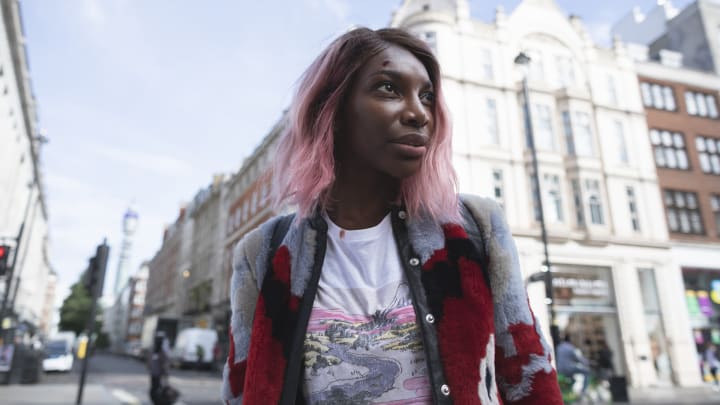
After Arabella, or Bella for short, reports her vague memory of an assault, we follow her as she goes through the different stages of adjustment, realisation, and healing.
Minimization (pretending “everything is fine”, or that the assault “wasn’t a big deal”)
Dramatization (cannot stop talking about the assault)
Suppression (refuses to discuss the incident)
As she founds out after having her rape kit taken, she was orally raped - but the DNA found is too minimal to compare with what the police have in their database and has to be compared one-on-one. And so although - with the support of her friends Terry and Kwame - she herself starts to examine her trauma and what has been done to her, the police investigation runs cold.
Freshly wounded, Bella ends up in bed with Zain - a man who's there to help her finish a draft for her book as her deadline has passed midst all of the events. He rapes her by removing the condom without her knowledge and consent and then continues to gaslight her, claiming that he "thought she knew". Although upset, she doesn't actually know that it was illegal for him to do so, but after having it confirmed by a police officer, she goes on to publicly exposing him at a book reading. A video of it goes viral, and suddenly Bella has become an online sensation.
As conversation and consideration around consent and what is a crime and isn't sparks, the people around her starts reflecting over their own sexual experiences and encounters.
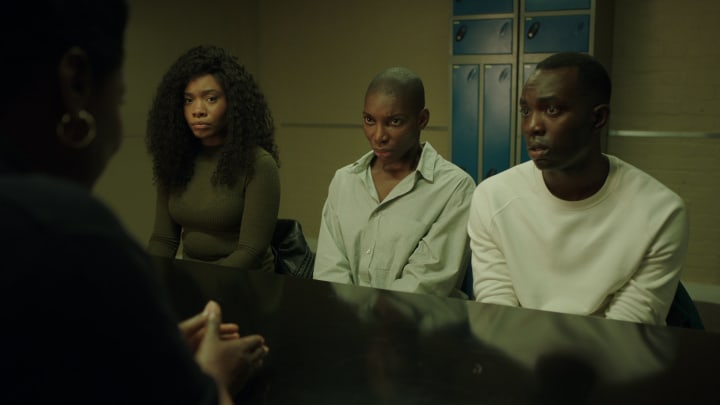
After a casual and discreet Grindr hook-up escalates, Kwame (Paapa Essiedu) is forced down and humped against as he lay powerless and silenced. He goes to the station to report it but is met with flippant comments and complete disregard for what has happened to him. Demeaned and ridiculed, he leaves and decided to stay quiet, as it has become clear that the concern for men's, especially gay & black men's, safety and justice is a joke.
There is a lot of shame and silence around men who are sexually assaulted, so to see it addressed and not neglected like it often is, is excellent. But it is a subplot that does end up feeling a bit rushed through. It isn’t ignored and it is braided into the subtext of Kwame’s character, but something about how there is no justice and no real healing or conclusion leave the story with a bit of loose hanging thread.
You could argue that is Kwame’s character; he doesn’t like to talk about this and would rather have him move on. Now, the way he moves on is by wanting to experiment with girls. He links up with a girl, at first its good but then she starts to really fetishise black men. It’s getting uncomfortable, but she coerces him to sleep with her. While pillow talking, she says the f-word and other homophobic things - Kwame then reveals that he is actually gay.
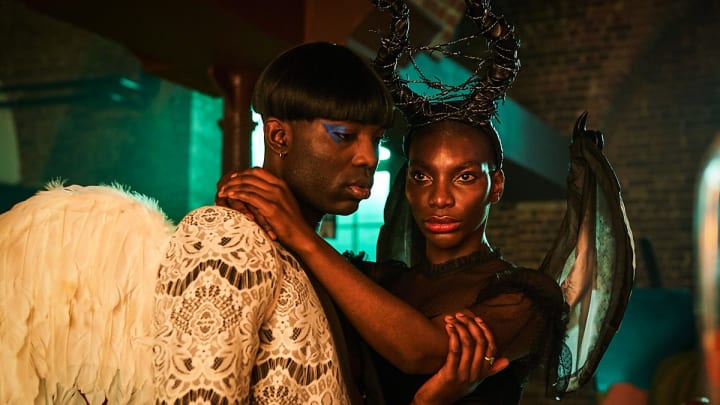
Both upset, she kicks him out, and he gladly leaves. Let’s be completely clear, he shouldn’t have slept with her without telling her that he was wanting to experiment - she has every right to be upset, disgusted and feel used. My criticism of this particular storyline is that it does feel as if the homophobia is disregarded and as if it was his own fault that he encountered it.
When he tells Bella and Terry what happened from his perspective - hanging out with a girl and feeling betrayed when finding out she was a homophobe - the reaction is mixed. Terry is empathetic, knowing what he is going through, but Bella - who is currently swimming through a flood of trauma with other victims at her feet seeking her advice and validation at every second - does not.
What is so outstanding about this show is that no character is 'an unproblematic queen' - they are profoundly complex and the nuances of their actions and reactions are interrogated and confronted. Even though Arabella is the protagonist of the story, she is perhaps the most complicated character on the show.
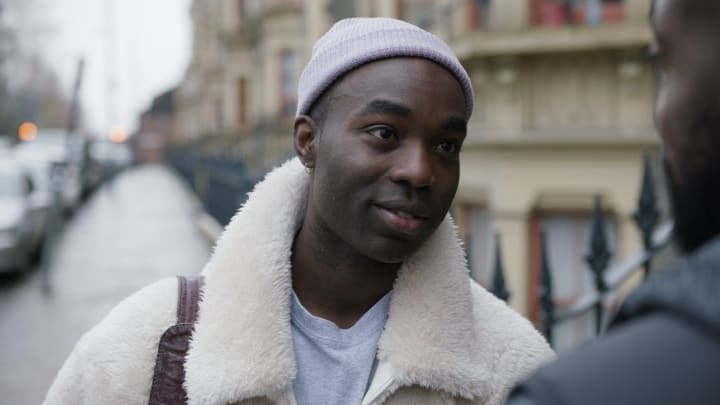
No one is put on a pedestal. When she confronts Kwame about him exploiting that girl for his sexual experiment, she is then confronted by Terry on her own careless actions (jokingly locking Kwame in a room with another man, right after his assault). In fact, it is actually how the internet has put Bella on a pedestal, that creates a lot of her conflicting character traits.
Because she has entered an echo-chamber of Yes-(wo)men, she neglects her own faults to fit her narrative. The issue and implications of social media in activist movements are tense, and the series shows that. From the good - bringing people together and empowering the disempowered - to the bad - lack of context and nuance, extremism and doxing, etc. (I do have an in-depth article on the depiction of social media in the series coming up soon, so keep an eye out for that.)
This is a sensitive topic, but I May Destroy You don’t have any time for tip-toeing around. In the 6th episode, The Alliance, we flashback to 2004 and venture into the dangers of false rape allegations and its ever-prevailing connections to racism.
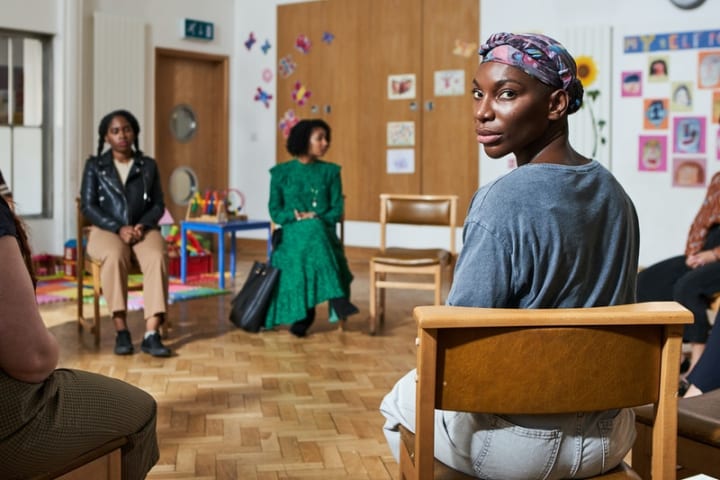
In the present time, Theodora (Harriet Webb) is running a support group for women who've been sexually assaulted, abused, and exploited. But as we time travel back to high school-times, blocky Nokia phones, and heavy eyeliners, we'll quickly be presented a with a very different narrative.
Thrilled with the taste of forbidden fruit, we watch as a younger Theo (played now by Gaby French) rushes to school to have time to hook up with a boy, Ryan (Josiah Mutupa). Mid-action, Ryan pulls out his phone and snaps a picture of Theo. Enraged, she finds out that other boys had apparently done the same to her and so he thought 'she was into it'. Trying to re-establish control, she tricks him into paying her some quid for better pictures. As he's getting dressed with his back turned to her, she throws his phone out the window (even though let's be real, we all know that a beast like that Nokia would probably have survived any fall).
So far, she still seems pretty kickass. But on a hunt for revenge on Ryan, she slits the back of her thighs with a kitchen knife. With her head down in her hands and the blood running down, her teacher hurries to her desk and asks her what has happened.
"Ryan. I didn't want to. He made me. He had a knife."
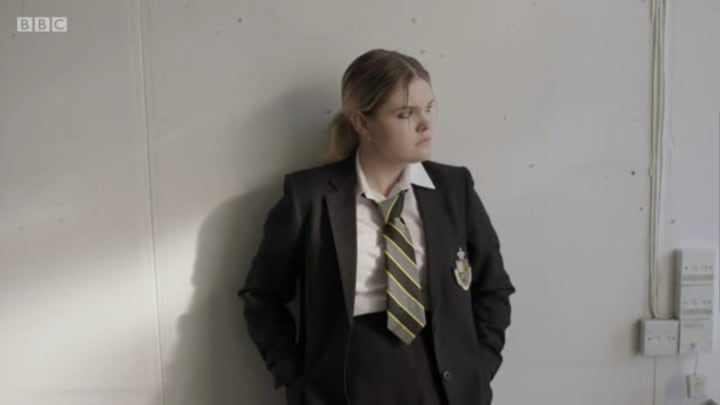
Thrown into the office and awaiting the police, Ryan is quite obviously terrified. Turns out that he had sent the photos to a friend of his, showing no knife or any of the claims of Theo's. Released, he joins his friends in cheers (Bella and Terry included ) and Theo is escorted away. "Fucking African monkeys," she mutters under her breath.
White women using their tears and perceived innocence to falsely accuse black men of being 'savage rapists' is nothing new. From the Scottsboro Boys to the Central Park 5, this dangerous stereotype is not only embedded in many racist individuals but judicially and systemically as well.
Yet even here, I May Destroy You lets nothing be cut and dry. As it is later unveiled, when Theo was younger, her mother coerced her into accusing her father of molesting her in court so her mother could obtain full custody. Before she had been taught that 2+2 equals 4, she had been taught how to use lies and crocodile tears to advantage herself.
And so it begs you to ask the question - when Theo opens her support circle with the words “I have been abused. I have been exploited. One in every two women have,” - is that exploitation a reference of resentment for what her mother had turned her into? Of the grooming that caused her to shut her father out of her life forever? Is this circle a way for her right her wrongs and deal with her guilt? Or is this just a cover-up for her actions, a way to deflect from blame and accountability for the harm she has done?
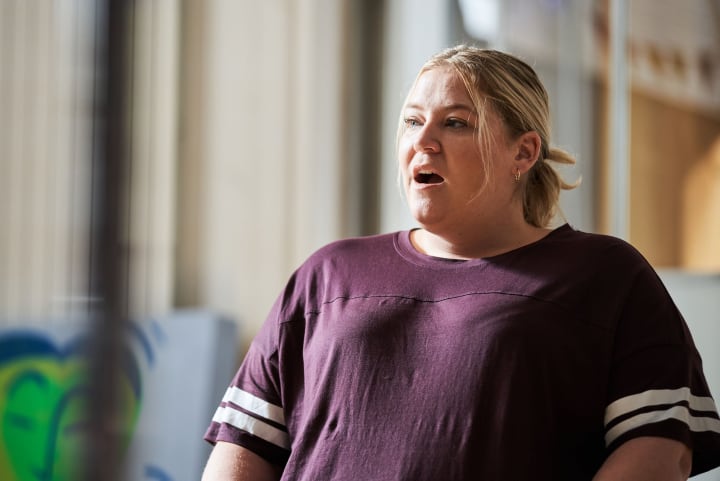
I May Destroy You digs up the roots of rape culture and all the many aspects and corners on the matter of consent. This is a conversation we need to have, no matter how tough it might be to talk about. Not only do many victims not know what resources they have available to them, but the education around getting consent is so absent that rape/predatory behaviour is normalised to the point where perpetrators see nothing wrong with their actions.
With vibrant cinematography, music that runs through the heartbeats of the story, and Michaela Coel as one hell of a powerhouse, I May Destroy You is the series of the year. It is heartwrenching, provocating, painful, and yet somehow also funny and invigorating at the same time.
The way it depicts Terry's dealing with the guilt of having let Bella be alone on the night of her rape, how she hides it in shame and instead does everything she can support and affirm her friend, ties to such deep and complex inner character conflicts. Bella's journey in healing and forgiveness, and how in the very last episode we watch the trauma physically leave her bedroom... I get goosebumps just thinking about it.
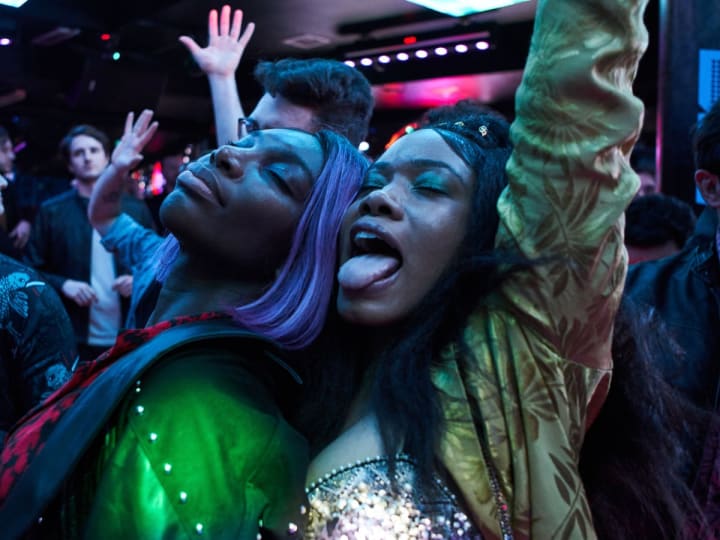
Not only is it an incredibly important social issue to discuss and so amazing to see something like this series being spread so far and wide, but it is masterfully executed from an artistic point of view. You will feel its thunder through your body, and then the light that follows as it concludes.
Perhaps one day we will not have to text a loved one what bus stop we are at and when they should expect us home, check the backseat of our car before entering, cover our drinks at the bar with our hand, loosen the cap on our hot cup of coffee and hug our keys between our fingers as we walk down the street.
All episodes of I May Destroy You are now available to stream on BBC iPlayer and HBO.
Thanks for reading along! If you want to support this article and my work, please consider sharing it online, with a friend, or even leave a tip! Any and all support is highly appreciated. For more, connect with me over on Instagram @MalinEvita :)
About the Creator
malin evita
Creator of Making It: Women in Film






Comments
There are no comments for this story
Be the first to respond and start the conversation.